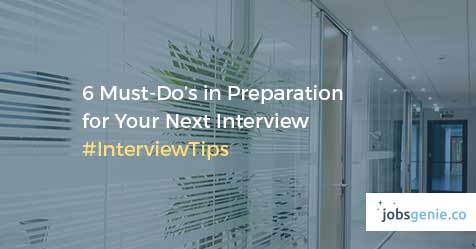Are you ready for a new challenge? Sign up for jobsgenie.co today!
Benjamin Franklin’s famous quote “by failing to prepare, you are preparing to fail” is rarely more fitting than when we are talking about job interviews. So many people miss out on their dream job simply because they didn’t prepare properly for their interview. Below are some essential (and simple) tips to make sure you’re fully prepared for your next interview. Take note and put yourself in the driving seat!
Research, Research, Research!
Given the ease of access to information via Google et al, there’s not really an acceptable excuse for not having done your research on both the company and the person that you are interviewing with. It may seem obvious, but you’ll be surprised by the number of people who turn up to an interview without doing any research at all. From the company’s perspective it shows a complete lack of enthusiasm and organisation, and almost certainly will result in a “no thanks!”.
Research the company
Prior to your interview set aside at least 30 minutes to research the company – visit their website and read their ‘about us’ page, get a real understanding for their products and services (and make notes of any questions you may have about them). Type the company name into Google News to see if there are any recent related articles. Take a look at their LinkedIn company page, here you’ll be able to see the company size and profiles of their current employees (maybe you already have professional connections with some of the staff that you can leverage).
Research the person interviewing you
Whilst you are on LinkedIn, look up the profile of the person interviewing you. Take a note of their career path and how long they have been at the company, look for any matching interests or skills – anything that will help you get a better understanding of the person and their situation and thus help you build rapport when you meet. As well as LinkedIn, search for them on Twitter and Facebook (or any other relevant social profile that can help you).
Prepare Your Route
Don’t be late
Being late for your interview is unacceptable and essentially ruins your chances of success before you’ve even had a chance to shine. Unfortunately, it happens far too often – which is such a shame as it’s so easy to be on time! Before your interview find out exactly where you have to be, once you have the address do a simple search on Google Maps and plan your route – Google Maps will tell you exactly how long it will take to get to your destination via multiple different routes and travelling methods, plan accordingly!
Don’t be too early
Arriving too early for an interview can be just as harmful as arriving late. Chances are the person interviewing you has a busy schedule, maybe they’ve got another meeting or deadlines to meet prior to your interview – turning up 30 minutes (or more) in advance of your interview disrupts their timeline and knocks them out of their stride – their resulting frustration will be aimed at you, not a good start. Ideally you want to enter the building / announce your arrival at reception within 5 minutes of your scheduled interview time (note: arriving at the destination is not the same as entering the building / announcing your arrival at reception! Feel free to arrive at the destination earlier to get yourself focused and collected – just don’t actually go in for your interview until 5 minutes before)
Practice Your Pitch
Perfect your elevator pitch
Almost all interviews will start off with a question similar to “Tell us a little more about yourself?” – this isn’t an invitation to give your complete employment and personal history. Instead, you should be able to summarise your career (so far) in 60-90 seconds. Prior to the interview take a look through your CV and write out a succinct and compelling overview of your career that demonstrates why you’re a great fit for the job.
Highlight your relevant accomplishments
Once you’ve given your initial overview, likelihood is the interviewer will want to drill a little deeper into your experiences, this is where you should have some projects / accomplishments prepared that you can detail, all the time focusing on experiences and skills that are most relevant to the job you are interviewing for.

